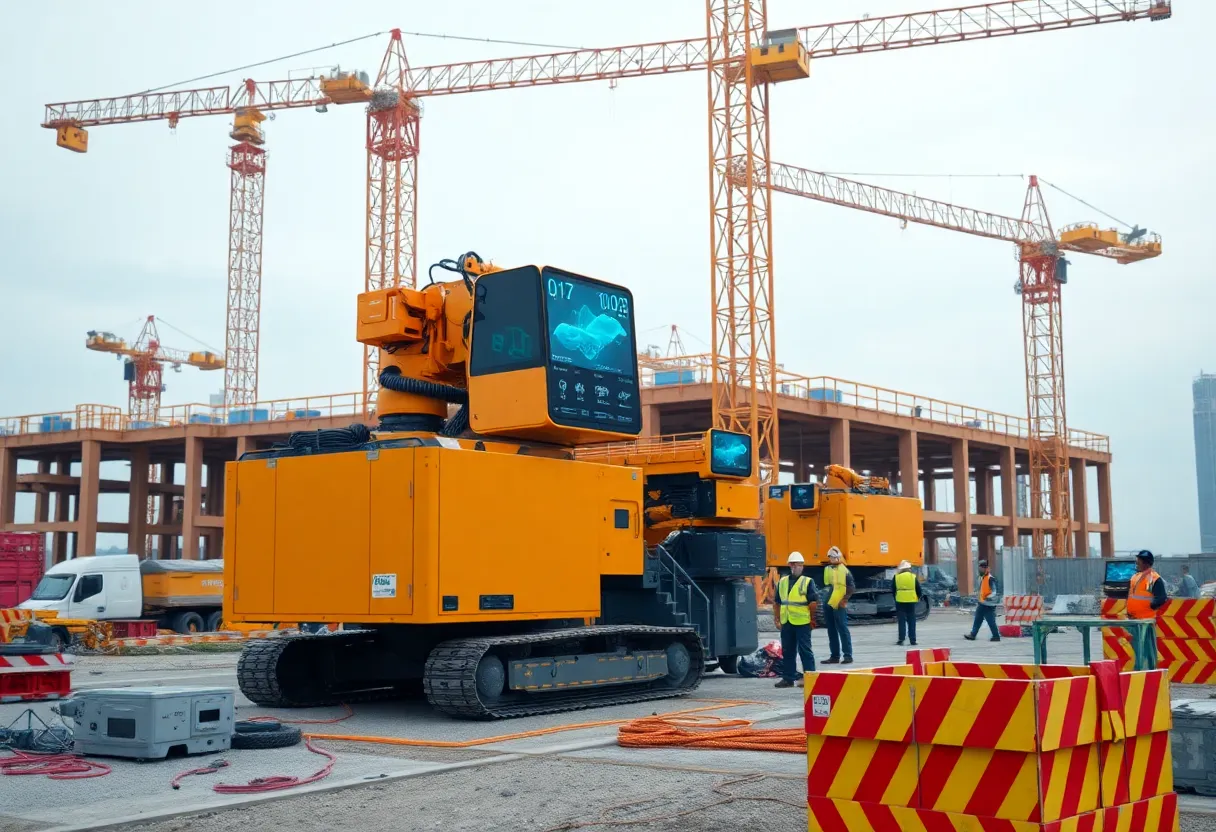News Summary
The integration of artificial intelligence (AI) is transforming the construction and real estate sectors, unlocking new levels of efficiency and enhancing customer experiences. AI is reshaping project management, procurement, and customer relations by automating workflows and providing real-time visibility. Its adoption is particularly impactful in sales and property management, leading to improved client services and significant cost savings. As companies increasingly implement AI solutions, they report higher job satisfaction and an enhanced quality of services, highlighting the ongoing transformation of these industries.
AI Revolutionizes Construction and Real Estate Industries
The construction and real estate sectors are experiencing a major transformation, thanks to the rapid advancements in artificial intelligence (AI). These technologies are not only boosting efficiency but also significantly enhancing the customer experience. Organizations that have long relied on disjointed systems, spreadsheets, and isolated data are finally moving towards a more integrated and streamlined approach.
Eliminating Inefficiencies
Traditionally, the construction and real estate industry had a fragmented approach to project management, procurement, and client communications, which often resulted in delays and cost overruns. AI is becoming a vital tool that addresses these challenges by embedding itself in core business systems such as Enterprise Resource Planning (ERP) and Customer Relationship Management (CRM). By automating workflows, AI improves decision-making and enhances overall project visibility.
Real-time Tracking and Resource Management
One key advantage of AI lies in its ability to offer real-time visibility into ongoing projects, making it easier for teams to collaborate effectively. AI can forecast potential disruptions, such as weather conditions or material shortages, allowing teams to better allocate resources and optimize worker deployment. Regular updates are automated, providing transparency and improving accountability among project stakeholders.
Enhancing Customer Interactions
AI tools are also making waves in customer service by responding to inquiries, streamlining proposal generation, and improving leasing processes. Furthermore, they aid in property management tasks, including rent collection and ensuring regulatory compliance. With AI, companies can improve their engagement with clients, resulting in higher satisfaction levels.
Improving Safety and Compliance
In addition to streamlining operations, AI enhances safety protocols by monitoring compliance checklists and generating reports automatically. This increases safety awareness and ensures that projects remain within legal requirements, ultimately benefiting both workers and investors.
Cost Savings and Efficiency Gains
According to industry research, AI adoption could lead to up to a 20% reduction in project delays and save operational costs by 15-20%. These enhancements positively affect long-term asset performance and sustainability by integrating with cutting-edge technologies such as digital twins, IoT sensors, and cloud data management.
Workforce Transition and Job Satisfaction
The integration of AI also facilitates a shift in workforce dynamics. As mundane tasks are automated, workers can focus on more valuable assignments, thereby improving project quality and enhancing client relationships. Companies that have embraced AI technologies report higher job satisfaction without significantly increasing staffing levels, allowing them to maintain or even improve the quality of their services.
Broad Implications for the Labor Market
While AI adoption brings numerous benefits, it also raises concerns about automation potentially impacting job availability in the construction and real estate sectors. Current estimates suggest that AI could automate around 37% of tasks in real estate, leading to an anticipated efficiency gain of about $34 billion by the year 2030. The overall health of the labor market, which correlates directly with real estate demand, could be influenced by these trends.
New Trends in Consumer Expectations
The ongoing AI revolution is now prompting the emergence of new startups designed to optimize the real estate transaction process, potentially reducing the need for traditional agents. This shift reveals changing consumer expectations regarding how properties are bought and sold.
Addressing Ethical Concerns
Despite its advantages, the rise of AI has stirred concerns about authenticity, especially regarding AI-generated content impacting real estate reviews. As reports suggest that 23.7% of Zillow agent reviews may be authored by AI by 2025, it’s crucial for the industry to maintain transparency and authenticity in review systems.
The Future of AI in Construction and Real Estate
As the integration of AI continues to grow, mindful leadership will be essential to tackle challenges related to data quality, integration, privacy, and ethics. The future of the construction and real estate industries looks promising as companies leverage these innovative solutions to create a more efficient, customer-focused landscape.
Deeper Dive: News & Info About This Topic
Additional Resources
- New York Post: Nearly 1 in 4 Zillow Agent Reviews in 2025 Written by AI
- Morgan Stanley: AI in Real Estate 2025
- PYMNTS: AI is Optimizing Physical Office Real Estate
- Wikipedia: Artificial Intelligence
- Axios: Ridley Home Selling Platform – Real Estate AI
Author: Construction CA News
The CALIFORNIA STAFF WRITER represents the experienced team at constructioncanews.com, your go-to source for actionable local news and information in California and beyond. Specializing in "news you can use," we cover essential topics like product reviews for personal and business needs, local business directories, politics, real estate trends, neighborhood insights, and state news affecting the area—with deep expertise drawn from years of dedicated reporting and strong community input, including local press releases and business updates. We deliver top reporting on high-value events such as the Rose Parade, Coachella, Comic-Con, and the California State Fair. Our coverage extends to key organizations like the California Building Industry Association and Associated General Contractors of California, plus leading businesses in technology and entertainment that power the local economy such as Apple and Alphabet. As part of the broader network, including constructionnynews.com, constructiontxnews.com, and constructionflnews.com, we provide comprehensive, credible insights into the dynamic landscape across multiple states.


